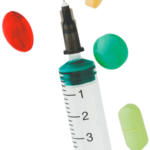In Japan, ozoralizumab will soon be available as a 30 mg subcutaneous auto-injection to treat patients with rheumatoid arthritis.


In Japan, ozoralizumab will soon be available as a 30 mg subcutaneous auto-injection to treat patients with rheumatoid arthritis.
Lisa Rapaport |
(Reuters Health)—Many pregnant women with rheumatoid arthritis (RA) may achieve low disease activity in the third trimester with a modern treatment regimen that includes anti-tumor necrosis factor (TNF) medications, a recent study suggests. Researchers examined data on 309 patients with RA who were pregnant or trying to conceive and who were treated with modern treat-to-target…
Reuters Staff |
NEW YORK (Reuters Health)—Immunosuppressants and anti-TNF drugs do not appear to increase the risk of extracolonic cancers in patients with inflammatory bowel disease (IBD), researchers from Spain report. IBD patients face an increased risk of colon cancer, and some studies have suggested there might be an increased risk of extracolonic cancer. Dr. Maria Chaparro from…
Reuters Staff |
NEW YORK (Reuters Health)—Anti-TNF drugs are more likely to improve growth in children with inflammatory bowel disease (IBD) if they’re given in the earlier stages of puberty, new findings show.¹ Children who achieve remission are also more likely to have satisfactory growth, the research team reported online on Sept. 21 in the Journal of Pediatric…
Anne Harding |
NEW YORK (Reuters Health)—Babies born to mothers who took anti-tumor necrosis factor (anti-TNF) agents during pregnancy have detectable drug in their bodies up to 12 months of age, new findings show. These infants should therefore not receive live vaccines during their first year of life, Dr. Mette Julsgaard of Aarhus University Hospital in Denmark and…

A Phase 3 study found secukinumab may be an effective alternative to anti-TNF therapies for treating psoriatic arthritis, suggesting interleukin 17A may play a role in the disease…
Will Boggs, MD |
NEW YORK (Reuters Health)—Treating inflammatory bowel disease (IBD) with tumor necrosis factor (TNF) inhibitors is associated with a doubling of the risk of central nervous system demyelinating disease, researchers from Denmark report. “Based on the current evidence anti-TNF should be used cautiously in patients with an own or family history of demyelinating disease,” Dr. Nynne…
Michael Shields & Ben Hirschler |
ZURICH (Reuters)—The U.S. Food and Drug Administration has accepted Novartis unit Sandoz’s regulatory submission for approval of a biosimilar copy of Amgen’s blockbuster anti-TNF drug Enbrel, the Swiss drugmaker said on Friday. Enbrel, or etanercept as the drug is known generically, is a big prize since it was the world’s fifth-biggest selling medicine in 2014…
Megan Brooks |
NEW YORK (Reuters Health)—Inflammatory bowel disease (IBD) patients who achieve remission on treatment may want to go off their IBD medications. But half or more of those who do will have a relapse, according to comprehensive analysis of relevant research. “Based on the studies with extended periods of follow up, relapse rates after cessation appear…
Reuters Staff |
NEW YORK (Reuters Health)—Dermatologic complications hit about one in five patients with inflammatory bowel disease (IBD) on anti-tumor necrosis factor (anti-TNF) therapy, leading to discontinuation of treatment, a French study finds. Dr. Laurent Peyrin-Biroulet, from University Hospital of Nancy, and colleagues note that dermatological complications of anti-TNF therapy are known to occur frequently in IBD…